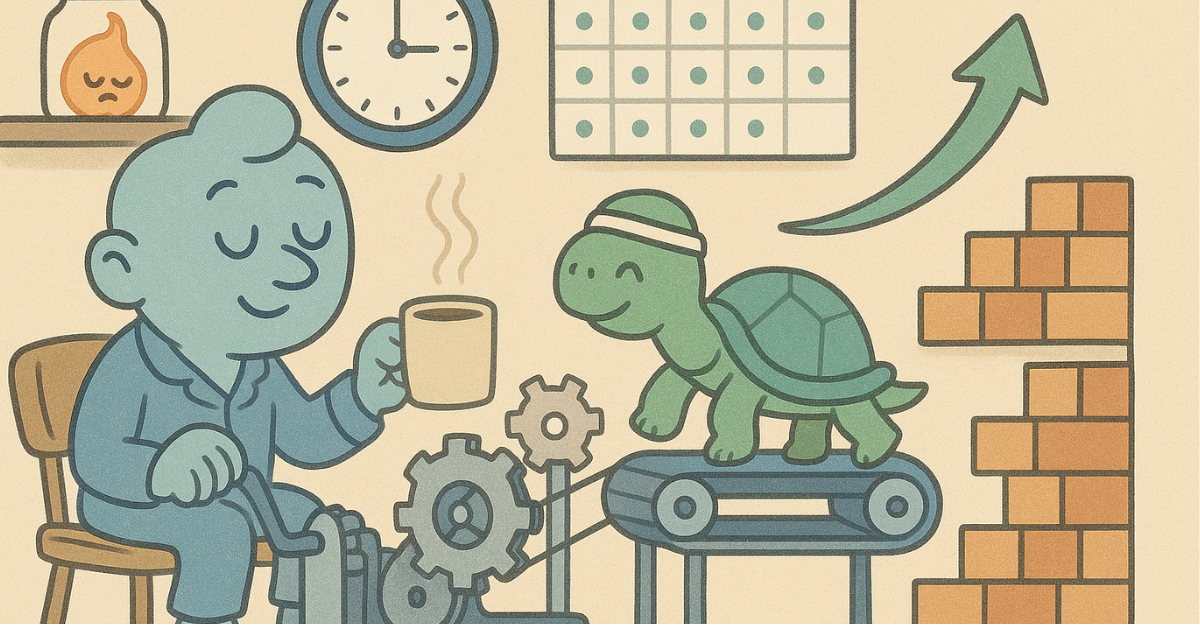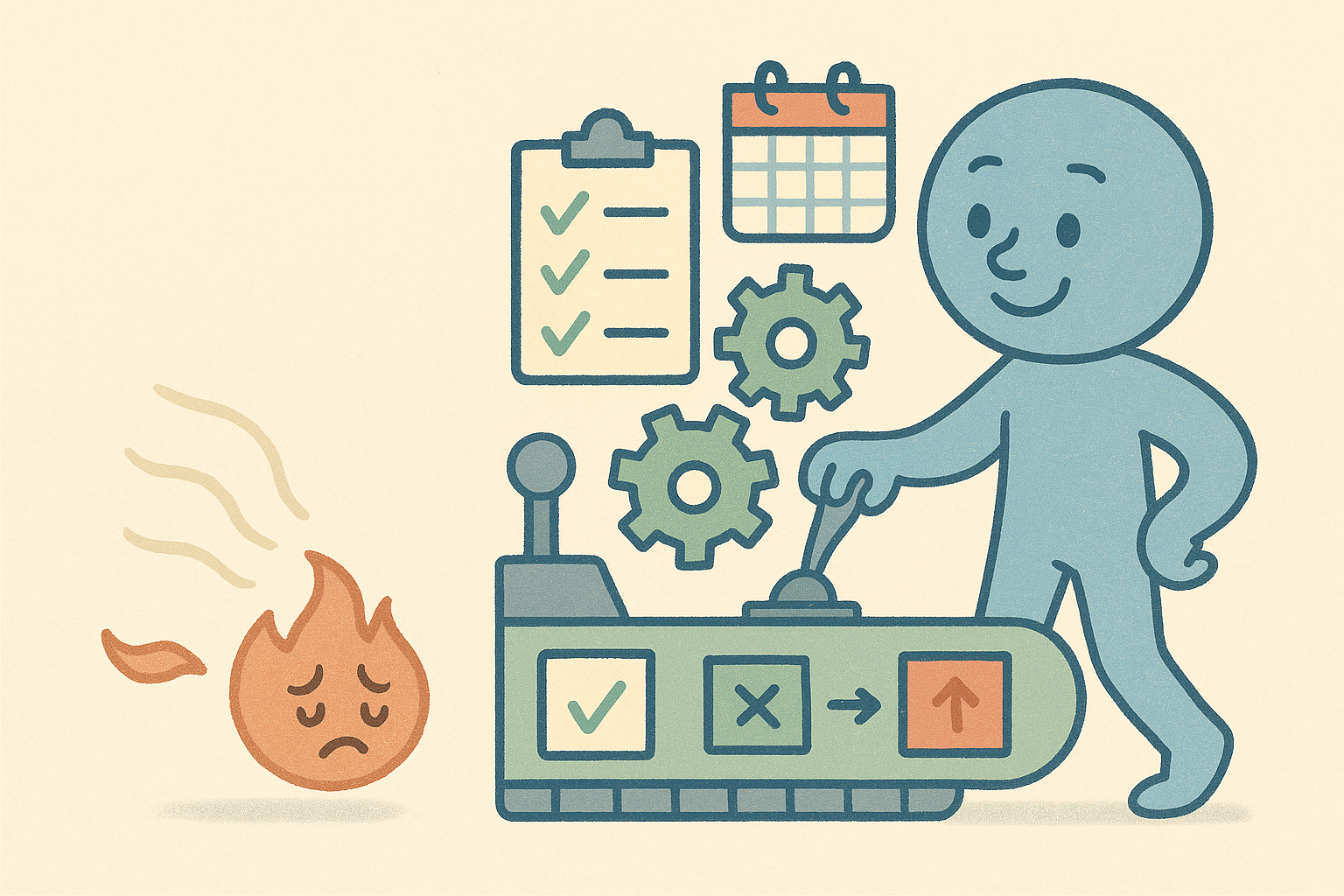
Let’s be honest: being a first-time founder feels like sprinting through a maze with your hair on fire.
Everywhere you turn, there's a new urgent task. You bounce from marketing to customer support, from fixing bugs to sending invoices, barely catching your breath. You start the day full of ambition, but by 4 p.m., you're frazzled and wondering where all the time went.
Sound familiar?
You're not lazy. You're not unfocused. You're just trying to brute-force your way through chaos without a system. And that leads to burnout, decision fatigue, and sometimes, quietly giving up.
Here’s the truth most people won’t tell you:
You don’t need productivity hacks. You need habits.
Discipline isn’t some magical force successful founders are born with. It’s structure. Systems. Routine. And yeah, it’s kind of boring but that’s exactly why it works.
The Real Problem: Chaos Disguised as Hustle

If you're a first-time founder, you've probably had days where you feel like you’re doing everything and getting nowhere. You’re constantly in motion, jumping from one task to the next, inbox pinging, Slack notifications stacking up, half-finished tabs open across your screen... but when the day ends, you can’t point to what actually moved the needle.
It feels productive. But it's really just controlled chaos.
And chaos disguised as hustle is one of the most dangerous traps you can fall into as a new founder.
Because when you're in that mode, everything feels urgent, so nothing gets the depth or clarity it deserves. You're reacting, not leading. You're busy, but not strategic. You’re exhausting yourself with effort, but not making meaningful progress.
Jess, a founder I worked with, learned this the hard way. She was building a coaching platform and wore busyness like armor. She’d start her days on Zoom calls, jump to Figma tweaks, throw in a customer support reply, spend lunch half-reading a SaaS pricing blog, then end her day tweaking code or writing copy while exhausted.
She was working nonstop and yet every week, her backlog grew longer. She’d say, “I’m working constantly, but somehow I’m always behind.” It was taking a toll. Her energy dipped. Her sleep suffered. Her confidence started to crack. She wondered if maybe she wasn’t cut out for this.
That’s not a sign of failure.
It’s a sign of trying to out-hustle a problem that requires structure, not more sweat.
This is what happens when we equate effort with effectiveness. When we mistake a packed calendar for a productive company. When we forget that startups are marathons built on rhythm, not sprints powered by adrenaline.
Founders aren’t supposed to run at 100 mph forever. That pace isn’t heroic, it’s unsustainable. And without intentional systems, even the most ambitious founder burns out or breaks down.
So if you’re in that cycle right now, constantly busy but internally panicked about falling behind, you're not alone. It's not a personal flaw. It's just a lack of structure. And the fix isn’t more hustle. It’s more habit.
The Boring Secret: Discipline = Systems, Not Motivation

Motivation is fleeting. Some mornings you’ll feel like conquering the world. Others, you’ll just want to hide under the covers. That’s human. What keeps you moving forward isn’t how fired up you are, it’s whether you have a structure to rely on when your energy dips.
That’s where simple, repeatable systems come in.
Let’s walk through a few that actually work:
1. Morning Setup + Evening Wrap Ritual
Start and end your day on purpose.
Morning setup (15 min):
- List your top 3 priorities (not 20, just 3).
- Review your calendar and commit to your time blocks.
- Do one thing before checking email or Slack.
Evening wrap (10 min):
- Reflect: What worked today? What didn’t?
- Log any open loops or thoughts for tomorrow.
- Clean up your workspace and shut down intentionally.
Jess started doing this and said it completely changed how her days felt. She ended work with a sense of closure instead of mental clutter. Just 25 minutes of structure created hours of clarity.
2. Block Time by Task Type (Build, Plan, Talk)
Not all tasks require the same kind of brain. Switching between writing code and pitching an investor? That’s mental whiplash.
Here’s a better approach:
- Build (deep work): coding, writing, product strategy
- Plan (thinking work): reviewing metrics, setting priorities
- Talk (collab work): meetings, emails, calls
Block these by theme in your calendar. For example, Tuesday mornings = Build, Wednesday afternoons = Talk. This avoids scatterbrain days and protects your focus.
Pro tip: Treat your deep work blocks like meetings with your future self. Don’t skip them.
3. Pre-Commit to Non-Negotiables
Yes, you’re a founder. But you’re also a human being. The fastest way to kill your momentum is to neglect your health, sleep, and sanity.
Set hard boundaries:
- 8 hours of sleep = a business decision
- 1 full day off a week = clarity multiplier
- Daily breaks = mental recovery, not laziness
Think of these like server uptime requirements. You wouldn’t let your product crash every few days — why let your brain?
Jess finally blocked out Sundays as her no work, no guilt day. She came back to Mondays sharper and more decisive. Her business didn’t fall apart. In fact, her revenue grew because she was making better decisions.
Final Thought: You Don’t Rise to the Level of Inspiration. You Fall to Your Routine.
The founders who build great companies? They’re not superhuman. They just build systems that work even on bad days.
You don’t need to be more motivated. You just need a boring, repeatable routine that protects your time, energy, and focus.
If you're feeling overwhelmed, it's not a personal failure. It's a systems failure.
And the good news? Systems are fixable.



